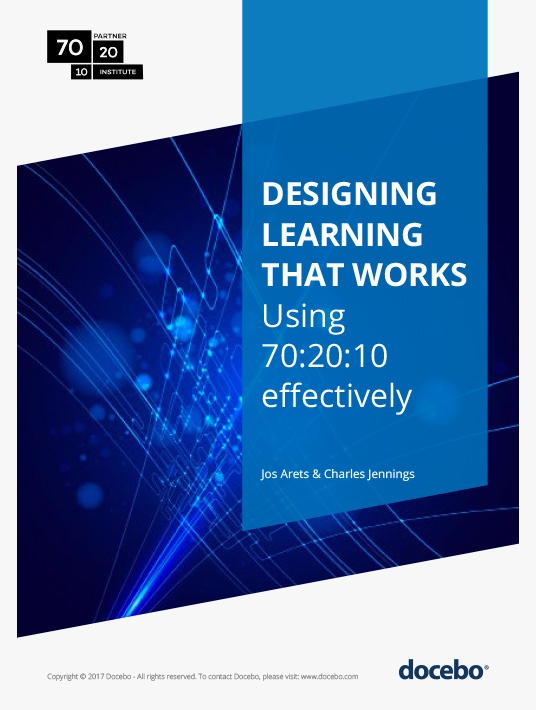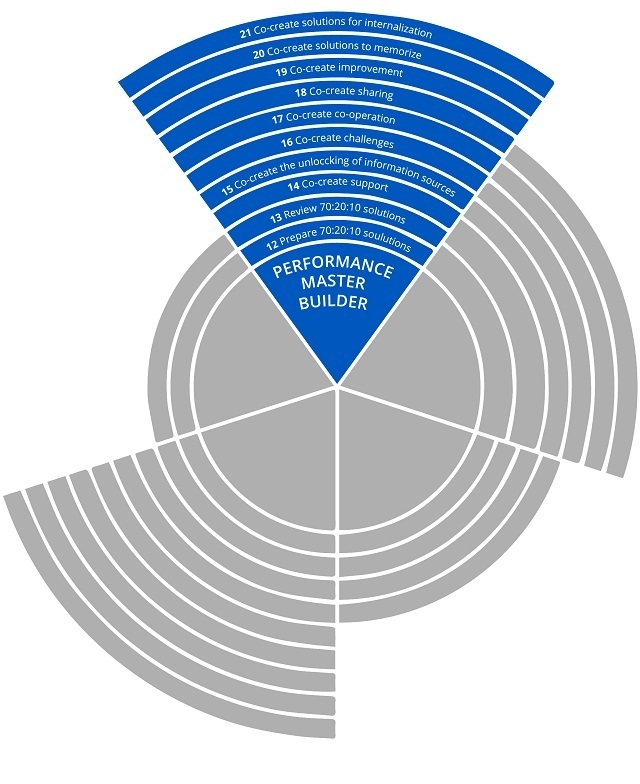70:20:10 Model Part III: Performance Master Builder
In our two previous articles, we focused on the role of Performance Detective and the role of Performance Architect. In this one, we will explore the role of Performance Master Builder.

The Performance Master Builder: The 70 And Performance Support
The Performance Master Builder role uses the critical tasks identified by the Performance Detective as a starting point. The Master Builder then co-creates effective solutions based on the Performance Architect’s design. The Performance Master Builder uses standardized processes and checklists to bring together resources and tasks to achieve an effective, fully developed solution as the outcome:

From Courses To Resources: Online Resources For All
Starting with the 70 provides opportunities to develop alternative solutions to the course catalog. Designing the 70 with a mindset focused on resources rather than courses, and with access rather than the need to memorize, results in extending learning services well beyond the 10.
This approach has several advantages:
- Easier scalability.
- Increased ability to make flexible, real-time adjustments.
- Greater connection to business needs.
- Ability to provide easy access to curated content based on reliable, selective, and relevant information to support working and learning.
The most important difference between a focus on resources and a focus on courses is the emphasis being not primarily on learning, but on performance support closer to the point of need in the workplace.
Resource-based approaches can also make it possible to organize structured certified training more effectively and to support formal learning and improve formal evaluation results.
The Increased Focus On Tasks
Organizations achieve results only when the right tasks are performed in the right way. A task is a set of interrelated activities that make it possible to achieve a predetermined result.
Tasks determine the connection between the desired results, how work is done, how the results are achieved and what performance standards apply. Tasks determine how teams divide up work and seek to achieve quality of output, so they are a logical starting point for designing 70:20:10 solutions.
They are also a means of performance support, which is beneficial to the 70 and enables workplace learning, which is the core of 70:20:10.
Performance Support
If you provide people in the workplace with the knowledge and information they need to do their jobs, will they need training? Gloria Gery answered this rhetorical question in 1991 with an emphatic ‘no’. Gery points out that providing knowledge within the workflow leads to fewer mistakes, higher productivity and faster acquisition of skills. However, it has taken decades for the importance of performance support and other workflow-based approaches to be recognized within the L&D world.
Performance Support Is Not The Only Way To Implement 70:20:10
There is a certain confusion about the role of performance support. Performance Support is not the only way to support or implement the 70 in 70:20:10. The 70 involves much broader, more holistic, opportunities and approaches. Challenges such as stretch assignments, opportunities to increase spans of control, apply reflective practices, special assignments and many other actions carried out within the flow of work can also be utilised as part of the 70 within a 70:20:10 solution.
Performance, Not Learning
Above all, 70:20:10 is not simply a solution box to support learning. Using the five new roles in the 70:20:10 Institute’s approach, and applying new processes and new tasks within those roles, will result in the improvement of performance aligned with organizational strategy and business needs.
This will result in supporting high performance instead of supporting learning. With 70:20:10, L&D can become capable of demonstrating business value instead of just learning value.
For more on how to use the 70:20:10 model effectively, download the free eBook Designing Learning That Works: Using 70:20:10 Effectively.
Related Articles:
- Free eBook - Designing Learning That Works: Using 70:20:10 Effectively
- 70:20:10 Model – Part I: Framework And The Role Of The Performance Detective
- 70:20:10 Model – Part II: Framework And The Role Of The Performance Architect








